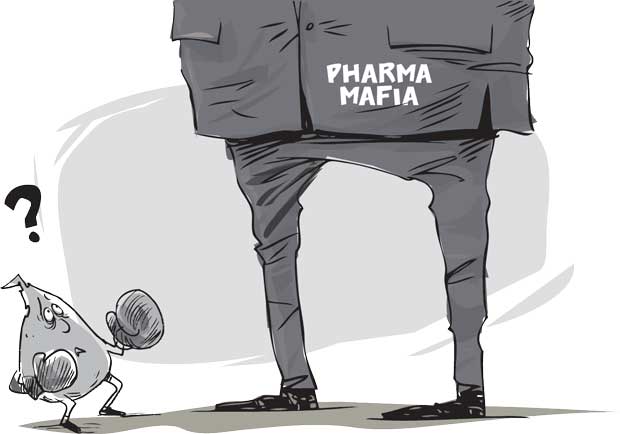Reply To:
Name - Reply Comment

In the health sector, corruption could kill people. The Daily Mirror in its editorial on Wednesday highlighted a report by transparency International’s British branch. The report on corruption in the global healthcare and pharmaceutical sector showed the deadly extent to which corruption has spread like a cancer and was posing a danger to millions of people.
The crisis is similar in Sri Lanka though, after a 10 year delay, the national government last year passed legislation to implement Professor Senaka Bibile’s essential medicines concept. Today we highlight some world famous Wikileaks disclosures on how the Americans sabotaged Prof. Bibile’s National Medicinal Drugs policy during the 1970s.
According to the Colombo Telegraph, leaked US Diplomatic Cables show that the US did play a key role in sabotaging the drug policy which Prof. Bibile tried to implement through the State Pharmaceuticals Corporation and the State Pharmaceuticals Manufacturing Corporation. In 1970, during the Sirimavo Bandaranaike administration, local agents of transnational pharmaceutical corporations were making huge profits by selling medicinal drugs under their trade names. They were alleged to be giving out biased information about the branded drugs as against those named generically.
Ms. Bandaranaike’s United Front Government had appointed Prof. Bibile and the then communist party leader Dr. S.A Wickremasinghe recommended head a Commission to probe this issue and it recommend the implementation of a national policy and the setting up of a state body to regularise the trade. Accordingly, in 1971 the then Industries Minister T.B Subasinghe appointed Prof. Bibile as the founder chairman of the State Pharmaceuticals Corporation.
On February 13 this year, a ceremony was held in Kandy to mark the 96th birth anniversary of Prof. Bibile who was widely respected for his advocacy of the government-controlled pharmaceutical purchasing plans often referred to as “rationalisation” of pharmaceuticals and the development of a national pharmaceuticals policy. His aim was to ensure that all people had access to quality drugs at affordable prices. According to the Wikileaks documents, In a Confidential US diplomatic cable dated March 23, 1973, the US State Department informed the US embassy in Colombo that the SPC had announced on March 9 that it would assume total control of imports of bulk raw materials and finished goods and would become the sole importer by the end of 1973. The Pharmaceutical Manufacturers Association (PMA) had requested that the embassy got in touch with the US drug firm representatives in Colombo and suggested that a protest to the government of Sri Lanka might be appropriate.
On March 27, 1973, the US Embassy replied to the Secretary of State saying that Embassy had been in touch with Warren Williams, the PFIZER representative in Sri Lanka. At a March 23 meeting, Prof. Bibile had laid down the laws to the local Pharmaceutical representatives including members of the Ceylon Pharmaceutical Manufacturers’ Association (CPMA). The document described the meeting as acrimonious. The US embassy said it believed the SPC intended to carry out its national medicinal drugs policy in a doctrinaire manner. It said the SPC’s actions appeared to leave little scope for private drug businesses and Mr. Williams unofficially said that PFIZER would have to pull out of Sri Lanka. The Ambassador said he planned to raise the issues with Minister Subasingha.
According to the Wikileaks documents, on March 29, 1973, the US Department of State wrote to the US Embassy in Colombo saying the US endorsed the plan to take up the issues with the Minister.
Eventually in 1976, according to information available to the Daily Mirror, the then US ambassador met premier Bandaranaike and told her that if Prof. Bibile’s national medicinal drug policy was not scrapped, the US would be forced to reconsider aid to Sri Lanka including the PL480 under which wheat flour was supplied at a subsidized price. At that time Sri Lanka was heavily dependent on US aid. Left with no option, the Prime Minister called Prof. Bibile to her office and told him that the policy would have to be scrapped. A sad Prof. Bibile told the Prime Minister that he also had no option but to quit. Thus one of the world’s most respected pharmacy scientists was lost to Sri Lanka. He went to British Guyana where he took up a United Nations post but within a year he died in circumstances that are still mysterious. What happened in the 1970s is happening now also. We hope the national government will give the newly-appointed national medicines regulatory authority, full powers to go ahead with the Bibile-principles and will not give in to the transnational drug Mafia.